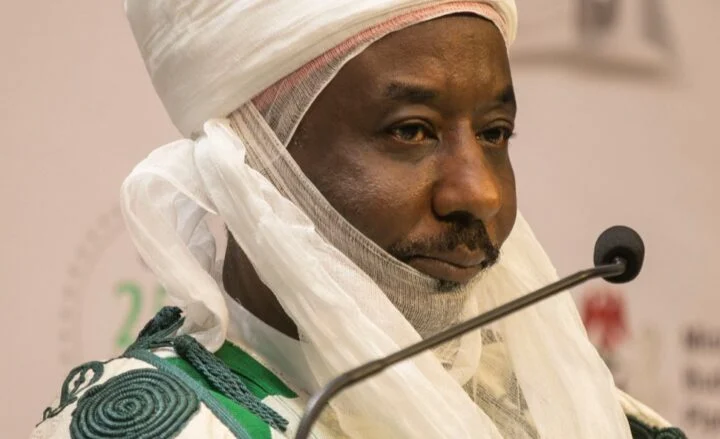THE 16th Emir of Kano, Alhaji Muhammadu Sanusi II, has issued a scathing rebuke of Nigeria’s prevailing value system, condemning the nation’s tendency to glorify corrupt individuals by rewarding them with prestigious public appointments and national recognition.
Speaking during an interview on Channels Television’s Politics Today on Wednesday monitored by News Point Nigeria, Sanusi lamented what he described as the total erosion of values in Nigerian society, pointing out that a nation which continues to celebrate material wealth, regardless of how it is acquired will inevitably perpetuate corruption and underdevelopment.
“A society in which material wealth, no matter how you get it, is respected, is glorified, where people who are known to have stolen money get rewarded with ministerial appointments, that society will continue to reproduce itself.”
Sanusi, a former banker, economist, and vocal reform advocate, warned that Nigeria’s failure to sanction corrupt officeholders while elevating them to greater positions of power creates a dangerous precedent.
This, he argued, entrenches a system in which public service is viewed as a route to personal enrichment, rather than a platform to deliver national progress.
He decried the prevailing mindset among many political actors who, he said, “go into government to make money,” rather than serve the people.
“We don’t have a sense of disgust for people who hold public office and amass wealth,” he added. “We reward them with more opportunities to continue enriching themselves.”
Sanusi also criticized what he described as the shallow motivations of many Nigerian leaders, who are more focused on personal acquisitions such as luxury homes, private jets, and large bank accounts than on building a legacy of integrity or contributing to national development.
“They define themselves by what they own… It is not important to them that people look at them and see thieves, criminals. Values do not matter to them,” he said.
Reflecting on Nigeria’s past, the Emir made a nostalgic reference to General Murtala Muhammed, the late former military Head of State, who was known for his discipline, simplicity, and commitment to public good.
Sanusi said that 50 years after Murtala’s leadership, Nigeria needs a radical moral reset, a regeneration of values across both leadership and citizenship.
“It is not about one person. The president alone, or governors, or ministers cannot change this country. We all have a role to play,” he stated.
He also highlighted the destruction of the civil service by self-serving politicians, noting that the systemic weakening of institutions has stripped bureaucrats of the courage to uphold ethical standards.
“Politicians destroyed the civil service. We must rebuild strong institutions that empower civil servants to say ‘no’ when politicians ask them to break the rules.”
The Emir’s remarks echo growing public frustration with elite impunity, as citizens increasingly call for accountability, transparency, and meritocracy in public office.
Sanusi, known for his outspoken views, urged Nigerians to restore value-based leadership, where honesty, diligence, and compassion are prioritised over wealth and status.







